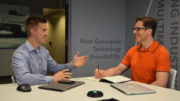DENVER, Colo. – Shortly after birth, Cathy Caplener was taken from her mother’s arms and placed within an incubator. Underweight and sickly, she spent the first few months of her life inside of a glass-and-steel box.
“My nervous system immediately went into fight or flight mode, because I’d lost my connection with the only environment I’d ever known, my mother,” Caplener said. “It’s an experience that’s always going to be with me. It will never go away.”
As the CEO of BabyWeConnect, a startup that uses wearable and mobile technology to transmit a mother’s presence to her child, Caplener is committed to reducing the isolation that infants can experience within incubators. An ambitious project, it’s the direct result of her lifelong struggle with toxic stress.
Beating Toxic Stress
Toxic stress occurs when a person is subjected to frequent, lasting, or severe stress. According to Harvard University’s Center on the Developing Child, toxic stress can negatively impact a newborn’s development, often leading to a variety of problems later in life.
In Caplener’s case, the toxic stress she experienced affected her for decades, manifesting as persistent anxiety and depression. Over the course of several years, she worked with therapists to come to terms with her early childhood trauma.

Caplener’s experience at 10.10.10 Health 2016 inspired her to found BabyWeConnect.
Once she understood how being separated from her mother had affected her, Caplener was determined to help others avoid a similar fate. But it was only when she took part in 10.10.10 Health, an annual, Denver-based venture generator, that she saw her opportunity to do so.
“When Dr. Sarah Watamura began talking about toxic stress, I started crying because I realized that’s what I’d been suffering from my entire life,” Caplener said. “In that moment, I understood that I had been born into toxic stress, and I didn’t want another baby to go through that.”
A professor of psychology at the University of Denver and the director of its Child Health & Development Lab, Dr. Watamura worked alongside Caplener throughout 10.10.10 Health, helping her create a market-based solution to toxic stress. During the program’s first days, Caplener made three unsuccessful attempts to solve the problem. Then, one morning near the program’s mid-point, she woke to a realization.
“I had been focused on addressing toxic stress later in life,” she explained. “But it’s the incubator baby that faces toxic stress from day one. That baby is born into toxic stress, and in all of the research I did, no one seemed to be talking about it.”
Alongside a team of volunteers that included a pediatrician, a psychologist, and a biomedical engineer, Caplener began designing an incubator that would reduce toxic stress for newborns by allowing them to sense their mother’s presence. A speaker in the roof of the incubator would transmit the sound of her breathing. A smart pillow would simulate the warmth of her skin and the beat of her heart. And, though separated by the incubator’s glass walls, the mother would be able to talk to her baby through a smartphone.
“Our enhanced incubator will be designed to give the baby the three key things it needs to form a healthy connection,” Caplener explained. “A baby needs to hear its mother’s breathing, sense her heartbeat, and feel the warmth of her skin. I never got those things, and here I am, an adult now, still missing them.”
The Right Connection

Dr. Annie Brook, founder of the Brook Institute, recently joined BabyWeConnect as its psychotherapist.
When 10.10.10 Health 2016 ended in early July, Caplener started forming her company, BabyWeConnect, to develop and commercialize the enhanced incubator. She quickly recruited a team of advisors that included physicians, midwives, trauma experts, and technologists. But, after a few months, the team realized that the enhanced incubator might not be their best launch strategy.
“We knew that the quickest way to get to market was to use technology that already existed to connect mothers and newborns,” Caplener explained. “We also saw an opportunity to start the company as a service provider.”
The team’s realization led to the current iteration of BabyWeConnect, which consists of a combination of wearable sensors, a smartphone app, and a package of services intended to help parents care for an incubator baby. Along with the pivot came a broader understanding of the company’s mission. BabyWeConnect would no longer focus solely on incubator-bound infants. Now its solution would be available to anyone who needed it.
“The way the world’s going, people are so connected that they’re disconnected,” Caplener said. “At BabyWeConnect, we want to change that. We want to help mothers and families connect with newborns using simple technologies that can actually strengthen a sense of connection for everyone.”
Learn more about Cathy Caplener and her work at Be Cause PR.





Be the first to comment on "Mother’s Love Is Going Digital"